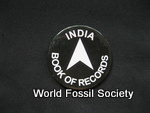@WFS,World Fossil Society,Riffin T Sajeev,Russel T Sajeev Oregon State University researchers have identified a spectacular new genus and species of flower from the mid-Cretaceous period, a male specimen whose sunburst-like reach for the heavens was frozen in time by Burmese amber. “This isn’t quite a Christmas flower but it is a beauty, especially considering it […]
Posts Tagged ‘Russel T Sajeev’
WFS News: Vectaerovenator inopinatus,New dinosaur related to T. rex
 August 12th, 2020
August 12th, 2020  Riffin
Riffin @WFS,World Fossil Society,Riffin T Sajeev,Russel T Sajeev A new species of dinosaur has been discovered on the Isle of Wight. Palaeontologists at the University of Southampton believe four bones found at Shanklin last year belong to a new species of theropod dinosaur. It lived in the Cretaceous period, 115 million years ago, and is estimated […]
WFS News: Evolution of the earliest dinosaurs
 August 9th, 2020
August 9th, 2020  Riffin
Riffin @WFS,World Fossil Society,Riffin T Sajeev,Russel T Sajeev Present knowledge of Late Triassic tetrapod evolution, including the rise of dinosaurs, relies heavily on the fossil-rich continental deposits of South America, their precise depositional histories and correlations. We report on an extended succession of the Ischigualasto Formation exposed in the Hoyada del Cerro Las Lajas (La Rioja, […]
WFS News: A new fossil reveals how a mysterious ancient insect captured its meals.
 August 7th, 2020
August 7th, 2020  Riffin
Riffin @WFS,World Fossil Society,Riffin T Sajeev,Russel T Sajeev Specialized Predation Drives Aberrant Morphological Integration and Diversity in the Earliest Ants Published:August 06, 2020DOI:https://doi.org/10.1016/j.cub.2020.06.106 Extinct haidomyrmecine “hell ants” are among the earliest ants known . These eusocial Cretaceous taxa diverged from extant lineages prior to the most recent common ancestor of all living ants and possessed bizarre […]
WFS News: Exceptionally small theropod eggs from Japan
 July 16th, 2020
July 16th, 2020  Riffin
Riffin @WFS,World Fossil Society,Riffin T Sajeev,Russel T Sajeev When most of us think of dinosaurs, we envision large, lumbering beasts, but these giants shared their ecosystems with much smaller dinosaurs, the smaller skeletons of which were generally less likely to be preserved. The fossilized egg shells of these small dinosaurs can shed light on this lost […]
WFS News: The first juvenile dromaeosaurid (Dinosauria: Theropoda) from Arctic Alaska
 July 13th, 2020
July 13th, 2020  Riffin
Riffin @WFS,World Fossil Society,Riffin T Sajeev,Russel T Sajeev Compared to the osteological record of herbivorous dinosaurs from the Late Cretaceous Prince Creek Formation of northern Alaska, there are relatively fewer remains of theropods. The theropod record from this unit is mostly comprised of isolated teeth, and the only non-dental remains known can be attributed to the […]
WFS News: 115-million-year-old fossil of new dinosaur species in Brazil
 July 12th, 2020
July 12th, 2020  Riffin
Riffin @WFS,World Fossil Society,Riffin T Sajeev,Russel T Sajeev A team of Brazilian researchers announced on Friday the discovery of a 115-million-year-old fossil belonging to a previously unknown species of dinosaur in the northeastern state of Ceara. The “Aratasaurus museunacionali” is a previously unknown species of the medium-sized theropods, meaning it had hollow bones and three-toed limbs. According to […]
WFS News: Exceptionally small theropod eggs from the Lower Cretaceous , Japan
 July 5th, 2020
July 5th, 2020  Riffin
Riffin @WFS,World Fossil Society,Riffin T Sajeev,Russel T Sajeev Exceptionally small theropod eggs from the Lower Cretaceous Ohyamashimo Formation of Tamba, Hyogo Prefecture, Japan Abstract The Kamitaki Locality in the Albian Ohyamashimo Formation in the eastern Hyogo Prefecture of southwestern Japan is among the richest Lower Cretaceous fossil egg sites in the world. So far, eggshells of […]
WFS News: Dry season limnological conditions and basin geology relationships with δ13C and δ15N of carbon sources
 July 3rd, 2020
July 3rd, 2020  Riffin
Riffin @WFS,World Fossil Society,Riffin T sajeev,Russel T Sajeev Dry season limnological conditions and basin geology exhibit complex relationships with δ13C and δ15N of carbon sources in four Neotropical floodplains Abstract Studies in freshwater ecosystems are seeking to improve understanding of carbon flow in food webs and stable isotopes have been influential in this work. However, variation […]
WFS News: Ancient submerged Aboriginal archaeological sites
 July 2nd, 2020
July 2nd, 2020  Riffin
Riffin @WFS,World Fossil Society,Riffin T Sajeev,Russel T sajeev Ancient submerged Aboriginal archaeological sites await underwater rediscovery off the coast of Australia, according to a study published July 1, 2020 in the open-access journal PLOS ONE by Jonathan Benjamin of Flinders University, Adelaide, Australia and colleagues. At the end of the Ice Age, sea level was much lower than […]



 Posted in
Posted in  Tags:
Tags: 
